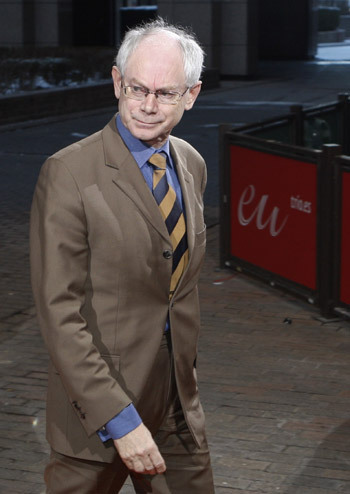
European Council President Herman Van Rompuy arrives to take office at the EU Council headquarters in Brussels, January 4, 2010. [Photo/Agencies]
BRUSSELS: The European Union (EU)'s first full-time President Herman Van Rompuy marked his first working day on Monday with a call for a special summit among EU leaders to discuss economic issues.
"This is my first official working day. I am preparing already the next European Council (summit) on Feb. 11, I took the initiative to convene this council," Van Rompuy, who took office in the new year but just started his job Monday due to the holiday, said in a statement.
|
 European Council President Herman Van Rompuy arrives to take office at the EU Council headquarters in Brussels, January 4, 2010. [Photo/Agencies] |
"We need more economic growth in order to finance on a sound basis our social model, to preserve our European way of life," he added.
EU leaders usually meet in March, which is traditionally focused on the economy.
It was widely expected that the special summit in February would not only tackle the current economic crisis, but also start talks on a new 10-year economic plan for the EU.
The new plan would replace the current Lisbon Strategy which is due to expire in 2010 and proved to be a failure if judged from the targets originally set.
The Lisbon Strategy had been designed with an aim to make the EU "the most competitive knowledge-based economy in the world" by 2010, which now appears to be impossible, while its two headline targets of 70 percent employment and research and development spending equivalent to 3 percent of gross domestic product (GDP) are both set to be missed.
The European Commission, the EU's executive arm, launched a public consultation in November on the new strategy, hoping to lead the 27-nation bloc towards a green, knowledge-based economy by 2020.
According to the commission, the EU 2020 Strategy would aim to deliver greener and socially inclusive growth, which is built on three thematic objectives, namely creating value through knowledge, empowering people in inclusive societies and creating a competitive, connected and greener economy.
The new economic plan is expected to feature high on the agenda of EU leaders' meetings in the first half of this year.
Spain, which took over the EU's rotating presidency for six-months in January, had said it would put the economic issues at the focus of its term.